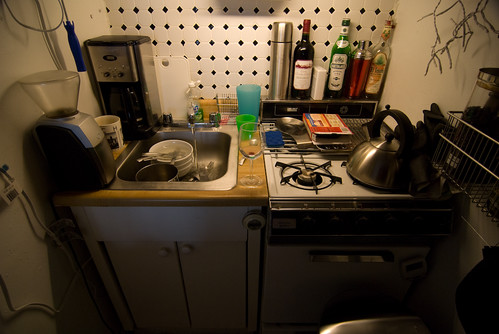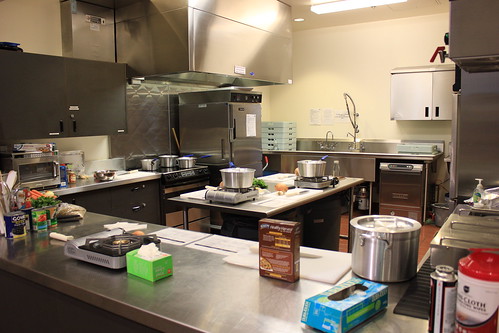The Idea
When people downsize their living spaces, as many are doing these days for economic and other reasons, extraneous rooms like the home office and the garage workshop disappear. Businesses have stepped in to fill those gaps: Coworking spaces provide offices for people who work at home or on the road but sometimes need a fully functional traditional office space. Makerspaces provide workshops for people who don't have the space for a large workshop or the desire to buy a ton of expensive, specialized tools.
But one room that remains, even in the tiniest studio apartments, is the kitchen.
If you eat out all the time, a kitchen is inconsequential. But it's harder to eat healthy that way, not to mention a lot more expensive. If you want to have fresh fruit and vegetables, you need a fridge to store them in. That takes space. If you want to save money by buying in bulk, you need storage space. If you want to prepare meals ahead of time, freeze them, then heat them up, that takes a lot of space. And to make home cooking enjoyable, you really need a fair amount of counter space to work on, not to mention a decent stovetop, an oven that can fit a half-sheet pan or casserole dish, a microwave large enough to reheat things, and a sink deep enough to make filling up pots and washing up easy, plus a dishwasher if you're feeding more than two people on a regular basis.
What if there were a place near your home where you could go to both cook and store your food? Maybe even eat it there? A family of any size could have a meal together even if their home is too small for a separate kitchen table to be practical. People could save money by buying frozen bulk items even if their apartment freezer is a 6"x12" shelf.
Now, I know that there are already businesses like Simply Supper and Dream Dinners, where you can prepare frozen meals that you reheat at home later. But this business model assumes that you have a freezer at home large enough to store all those meals and an oven large enough to reheat them. Those businesses are great for busy middle-class families.
But one reality of our current economic climate is that the middle class is disappearing. If you want your business to succeed these days, you're better off selling luxury goods and services to the wealthy or inexpensive essentials to lower-income folks. The Kitchenette targets this second demographic.
How many people would be able to afford a nicer place to live if they didn't have to worry about having a fully functional kitchen? How much space is wasted by ovens and stovetops that never get used? How many people would love to cook homemade meals, but are hampered by a lack of space and equipment?
Just like a Makerspace provides an environment and tools that are impractical for everyone to have at home, The Kitchenette would have all the large, bulky, useful appliances that make cooking fun and easy, like waffle irons, food processors, and stand mixers. And of course there would be helpful staff on hand to show you how to work unfamiliar tools and answer cooking and meal-planning questions.
If you eat out all the time, a kitchen is inconsequential. But it's harder to eat healthy that way, not to mention a lot more expensive. If you want to have fresh fruit and vegetables, you need a fridge to store them in. That takes space. If you want to save money by buying in bulk, you need storage space. If you want to prepare meals ahead of time, freeze them, then heat them up, that takes a lot of space. And to make home cooking enjoyable, you really need a fair amount of counter space to work on, not to mention a decent stovetop, an oven that can fit a half-sheet pan or casserole dish, a microwave large enough to reheat things, and a sink deep enough to make filling up pots and washing up easy, plus a dishwasher if you're feeding more than two people on a regular basis.
What if there were a place near your home where you could go to both cook and store your food? Maybe even eat it there? A family of any size could have a meal together even if their home is too small for a separate kitchen table to be practical. People could save money by buying frozen bulk items even if their apartment freezer is a 6"x12" shelf.
Now, I know that there are already businesses like Simply Supper and Dream Dinners, where you can prepare frozen meals that you reheat at home later. But this business model assumes that you have a freezer at home large enough to store all those meals and an oven large enough to reheat them. Those businesses are great for busy middle-class families.
But one reality of our current economic climate is that the middle class is disappearing. If you want your business to succeed these days, you're better off selling luxury goods and services to the wealthy or inexpensive essentials to lower-income folks. The Kitchenette targets this second demographic.
How many people would be able to afford a nicer place to live if they didn't have to worry about having a fully functional kitchen? How much space is wasted by ovens and stovetops that never get used? How many people would love to cook homemade meals, but are hampered by a lack of space and equipment?
Just like a Makerspace provides an environment and tools that are impractical for everyone to have at home, The Kitchenette would have all the large, bulky, useful appliances that make cooking fun and easy, like waffle irons, food processors, and stand mixers. And of course there would be helpful staff on hand to show you how to work unfamiliar tools and answer cooking and meal-planning questions.
The Business Model
Of course, the real question is, how do you make money?
Using the Coworking model, people could pay a monthly fee for unlimited kitchen use, or pay per-use. There would also be a charge for pantry and fridge/freezer space rental, x amount for so many cubic square feet. This space would be locked, so everyone feels secure that their food won't be taken by another customer. Unlike the businesses linked above, you would bring your own ingredients (though The Kitchenette could have some basic spices on hand, such as salt, pepper, and cinnamon). The Kitchenette could also offer cooking classes, which would be a great marketing tool for recruiting new customers.
But since this business is targeting low-income families and individuals, what about those who can't pay much? People would be allowed to pay for only the pantry and fridge space, then make up the monthly membership fee by helping clean up a set number of hours. This would not only make The Kitchenette more affordable, but also cut down on maintenance costs and give customers a sense of ownership.
The ideal location for The Kitchenette is near a grocery store, in an urban center with dense housing. The business would be a boon for any grocery or bulk store nearby, because it would encourage people who otherwise might not buy much food to purchase more.
Imagine families of any size able to sit down together and eat a home-cooked meal. Imagine people rediscovering the lost art of cooking together. Imagine healthy, sustainable food replacing processed fast-food in many families' diets. This is my vision for The Kitchenette.



No comments:
Post a Comment